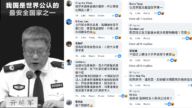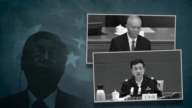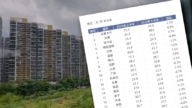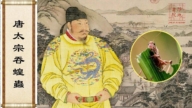【新唐人2013年10月02日讯】10月1号是中共窃国64周年,中共喉舌刊发社论,9次提到所谓的“梦”和“梦想”,中共总理李克强也提到,要实现所谓的中华民族伟大复兴的“中国梦”。评论指出,共产党的梦想和老百姓的梦想背道而驰,现在百姓对党的迷信崇拜已经彻底破灭,中共只能打出民族、国家梦,来忽悠老百姓。
9月30号,《人民日报》刊发:《为现代中国凝聚梦想力量》的社论,宣称中国人离所谓的民族复兴梦想,从未像今天这样接近。在这篇共计8段的社评中,竟然出现了9次所谓的“梦”和“梦想”。网友嘲讽:中共做的是“青天白日梦”。
原《河北人民广播电台》编辑朱欣欣认为,中共以“复兴民族的梦想”作为包装,借此绑架、欺骗国民跟着它走。
原《河北人民广播电台》编辑朱欣欣:“中共现在来讲,已经从过去(对)毛泽东的领袖个人的崇拜,到共产党的崇拜迷信,已经彻底破产了,到现在只能打出民族国家所谓的梦想,靠这个来忽悠老百姓。”
9月30号晚,中共国务院举办的“十.一”活动上,李克强在讲话中也提到:为实现所谓的中华民族伟大复兴的“中国梦”而不懈奋斗。
朱欣欣:“中共长期以来,它的所做所为让老百姓看到了,它根本就不能代表一个民族或国家的理想,也不能代表每个人的个人幸福的梦想,它完全就是为它一党的统治、一党专政,少数的特权阶层为它们特权的理想存在。”
中共总书记习近平上任后,提出所谓“中华民族伟大复兴”的一个构想。今年3月的人大闭幕会上,习近平在讲话中9次提到“中国梦”。
党媒社论声称,中国社会各方面,现在都激发出实现梦想的信心与力量。但是,旅美原大陆史学家刘因全指出,中共最近大肆打压网路自由、镇压维权和信仰人士,在这种情况下提民族梦想,没有人会相信。
旅美原大陆史学家刘因全:“它们已经可以说是黔驴技穷了,走到了绝路,没有什么可提的了,改革开放它们也不敢说,政治体制改革也不敢说,它们骨子里还想恢复倒退向左转,恢复到毛泽东那个时代去,但是它们也不敢说出口来,只能用这种梦来忽悠人。”
数周以来,中共大肆抓捕网路批评人士。《德国之声》说,共产党认为自己的言论控制权受到了威胁,知名博主有的被捕、有的被迫在电视上出丑。一场“网路文革”就要逼近了吗?
而9月10号,中共“两高”出台新的司法解释,指所谓编造恐怖信息者,没有传播行为也可以定罪﹔民众发出所谓“开玩笑”的网贴,也可能要承担法律责任。
朱欣欣:“老百姓从切身的体会和真实的生活能够看到,只要中共存在一天,中国的梦想,老百姓的梦想,就会一步步的更加的遥远,共产党的梦想和老百姓的梦想是背道而驰,它都是为了一党专制的,维持它的所谓的红色江山,为它所服务的。”
今年元旦,广东《南方周末》刊发弘扬“中国梦”的社论,结果如同做了一场“噩梦”,成为轰动一时的“南周事件”,这篇社论最后改为了“家国梦”。
朱欣欣:“今天这个国觞日,作为一个普通的国民,应当好好的反思中共建政以来的历史,应当彻底的和中共进行决裂,不要被它的宣传所迷惑,要看清这个大的趋势,没有自由,没有民主,没有宪政,中国梦是不可能实现的。”
中国的网路世界发出了人民的心声,网民自创的“中国梦”,道出了中国人民真正的梦想所在。
“中国梦不是独裁的梦,中国梦不是专政的梦,中国梦不是‘屏蔽’的梦,中国梦不是贪官的梦。中国梦是人民的梦,中国梦是民主的梦,中国梦是宪政的梦,中国梦是民富的梦。”
采访编辑/李韵 后制/陈建铭
The Chinese Regime’s China Dream
October 1 is the 64th anniversary of the Chinese Communist
Party’s (CCP) establishment of the Peoples Republic of China.
In an editorial from a CCP media outlet, “the dream"
was mentioned nine times.
Chinese Premier Li Keqiang also mentioned achieving
the great rejuvenation of the China dream.
The editorial said that the CCP’s dream is totally opposite
from that of the Chinese people.
Now, the public’s illusion towards the CCP has disappeared,
so it can only play on the national dream to fool people.
On September 30, People’s Daily published its editorial
entitled, “To Dream of Modern Chinese Cohesion Forces,"
which stated that Chinese people have never been so close
to a dream of national revival.
The word “dream" appeared nine times in the editorial.
Some netizens said what the CCP has is nothing
but a daydream.
Zhu Xinxin, former editor of Hebei People’s Radio, believes
that revival of the nation’s dream is only the packaging
for the CCP to mislead people.
Hu Xinxin: “As far as the CCP is concerned, it has realized
the public has given up their cult-like worship of Mao
and their devotion to the Party, so they can only rely on
the national dream to deceive people."
On September 30, Li Keqiang mentioned, during activities
organized by the State council, to achieve the great
rejuvenation of the China dream with persistence.
Zhou Xinxin: “Under the CCP rule, Chinese people are
very clear that what the CCP has done can neither represent
the ideal of a nation or a state, nor the dream of the people.
What the CCP has done is entirely for a one-party rule,
one-party dictatorship, and the privileged existence of a few people."
Since Xi Jinping took office, he brought forth his vision
of the so-called great rejuvenation of the Chinese nation.
In March 2013, Xi mentioned his China dream nine times
at the closing of the National People’s Congress.
The CCP’s media editorials claimed that currently, all aspects
of China’s society is showing inspired confidence
and power regarding fulfilling the China dream.
However, Liu Yinquan, US-based historian, pointed out
that recently the CCP wantonly suppressed Internet freedom,
human rights activists and religious groups, so no one
believes it when it mentions the national dream.
Liu Yinqiuan:" They are at the end of the rope.
It’s a dead end and no way out.
They mention neither reform and opening nor political
reform.
Deep down inside, they wanted to go backwards
to the Mao era, but they are afraid to utter it.
Thus, they can only take a China dream to mislead people."
In recent weeks, many Internet critics were arrested.
Deutsche Welle said that the CCP considered these people
a threat to its power to control speech.
Many well-known bloggers were forced to show their faces
on television.
Is the Internet Cultural Revolution coming near?
On September 10, the CCP announced new judicial
interpretation, in which people who spread fabricated information
can also be convicted.
When people publicize their jokes online, they are also
liable for their postings.
Zhu Xinxin: “People can see, from their personal experiences,
as long as the CCP exists, China’s dream
and the people’s dream will move further apart.
The CCP’s dream is entirely different from that
of the Chinese people.
The CCP’s dream serves as a means to maintain
its one-party dictatorship."
On the Eve of 2013, Guangdong’s Southern Daily published
its editorial to promote the China dream,
which turned into a nightmare.
In the end, the editorial had to change its title to,
“Home Country Dream."
Zhu Xinxin: “Today is a national holiday
for the establishment of our country.
As ordinary citizens, we should properly reflect the history
of the CCP and break away from it.
We will not be fooled by its publicity, but we should look
at the trend.
Without freedom, democracy, and constitution,
the China dream will be impossible to achieve."
Netizens in Mainland China have created their own
China Dream on the Internet, expressing the voice
of the people and pointing out where the Chinese people’s
dream truly lies.
China dream is not a dictator’s dream, not a one-party dream,
not a covering up dream, and not a corrupt official’s dream.
China dream is the people’s dream, a democratic dream,
a constitutional dream, and a making-ordinary-citizens-rich dream.




























